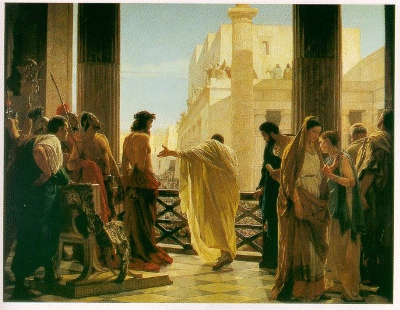Go to dark Gethsemane, ye that feel the tempter’s power;
Your Redeemer’s conflict see, watch with Him one bitter hour,
Turn not from His griefs away; learn of Jesus Christ to pray.See Him at the judgment hall, beaten, bound, reviled, arraigned;
O the wormwood and the gall! O the pangs His soul sustained!
Shun not suffering, shame, or loss; learn of Christ to bear the cross.Calvary’s mournful mountain climb; there, adoring at His feet,
Mark that miracle of time, God’s own sacrifice complete.
“It is finished!” hear Him cry; learn of Jesus Christ to die.Early hasten to the tomb where they laid His breathless clay;
All is solitude and gloom. Who has taken Him away?
Christ is risen! He meets our eyes; Savior, teach us so to rise.— James Montgomery (1771-1854)

Agony in the Garden, Andrea Mantegna (c. 1460)
In the churches of the Western hemisphere where the ancient customs of the historic Church are observed, today marks the beginning of the Easter Triduum (three days), an annual pilgrimage of the Church that follows Jesus from the Upper Room to the Garden of Gethsemane, the Sanhedrin, Herod’s Court, Pilate’s Palace, the Via Dolorosa, Golgotha, Joseph’s Tomb, and the Resurrection from the Dead. Tonight — known as Maundy Thursday in English, a name derived from the Mandatum or New Commandment that Jesus gave to His disciples as He washed their feet in the Upper Room – Christian ministers around the world will stoop to wash the feet of their congregations. Tonight, the very first Communion of Jesus, the Last Supper, will be remembered at their altars. Then, to symbolize the trials of Jesus, those altars will be stripped bare and the consecrated host will be moved to an altar of repose often decorated to represent the Garden of Gethsemane.

The Last Supper, Leonardo da Vinci (1452-1519)
This year, I had the privilege to begin Holy Week by conducting a Palm Sunday performance of Johann Sebastian Bach’s St. John Passion with a community chorus, professional soloists and chamber orchestra. This powerful, dramatic score is one of the best supports I know for a case to be made that Bach, should his circumstances have permitted or his employment required it, would have been a tremendous composer of operas. This is music that is visceral, surging, plaintive, malevolent, gleeful, dolorous and solemn as the portion of the Gospel text that is being sung at any given moment in its two-hours-long presentation requires. I made some remarks to the audience in that concert about the work itself and about the story that inspired it. I’d like to share a summary of those remarks here:
Whether one approaches the Passion from the point of view of a believer as I do, or rather as a profound meta-narrative involving a significant historical figure whose life is widely influential on human philosophy, there is a compelling drama at play in this tale of Jesus of Nazareth who is accused, tried, convicted and crucified for crimes He didn’t commit, abandoned by His friends, betrayed by one of His closest confidants, and cruelly tortured by his captors. Religious belief aside, this is a story of a tragic misunderstanding that can be appreciated on purely literary terms, with a radical philosophical message.

Ecce homo, Antonio Ciseri (1821-1891)
The tragic misunderstanding by the religious and political leaders that Jesus is a political insurrectionist leads to His demise at Calvary. The teacher who said “love your enemies,” and “turn the other cheek” is put to an awful test which He passes only by complete immolation. The insurrection Jesus was leading was not against temporal politics to overthrow a potentate and establish a new government, it was an insurrection against the darkness of human nature itself, the hideous aspects of prejudice and hatred that keep us from loving each other as He commanded.
This wasn’t an “us vs. them” dichotomy as all human conflicts hitherto had been. It was instead “us vs. Him.” He kept telling the people that “my Kingdom is not of this world,” but they simply couldn’t understand. They didn’t understand why He went out of His way to befriend and comfort the outcasts of society; the prostitutes, publicans, tax collectors, Samaritans and lepers. When I say they, of course, the Christian view is that we are they. We were not His enemy, though we framed the conflict so in our own minds. His enemy was darkness, evil, sin and death. We didn’t even realize that He was fighting on our behalf, because we were so busy fighting for the enemy. And He won. He won by losing, the ultimate paradox.
Sadly, this story itself, especially St. John’s version, has been tragically misunderstood over the centuries and used to justify persecution and pogroms against Jewish people. It seems that the one thing He came to teach us, the one thing He spent so much of His time talking about, this radical notion that we should LOVE each other, ourselves and Him is the one thing we simply cannot get right. Ever.
We have tragic misunderstandings in our time that forced a Palestinian friend of mine and his family to flee their ancestral home without recompense some forty-odd years ago. We have a tragic misunderstanding in Iran whereby a man is sentenced to death simply for becoming a Christian. We have the tragic misunderstanding of Islamophobia reaching fever pitch in our American political discourse, tarring a billion peaceful co-religionists with the extremist nihilism of a handful of criminals. We have a tragic misunderstanding in Florida where a young man is dead seemingly because he was in the wrong place at the wrong time wearing the wrong clothes, which brought suspicion upon him.
We have the tragic misunderstanding and misapplication of Scripture that led to the notorious, long-standing and heinous policies of racial discrimination at Bob Jones University.
We have the tragic misunderstanding over the nature of homosexuality, the obsession over six little verses in the Bible – out of over thirty-one thousand – whose meaning and application are both unclear and under ongoing debate by serious Bible scholars. This tragic misunderstanding kills people. By murder, as was the brutal case of Matthew Shepard. By suicide, as happens so often among young Christian gay and lesbian people like Tyler Clementi and Eric James Borges who are so bullied and besieged by Biblicists that they lose their way.

Christ Reasoning with Peter, Giotto di Bondone (c. 1266-1337)
It is these tragic misunderstandings that Jesus came to put to rest. He wants to shine the light of His love into our darkness. He wants to stoop to wash our feet. He wants us to stoop to wash each other’s feet. He wants us to learn to love. JUST LOVE. When we do, His kingdom will come and His will will be done on earth as it is in heaven. Until then, our tragic misunderstandings will continue to divide us from Him and from each other. We can change the world if we would only learn to love.
Ubi caritas et amor, Deus ibi est.
Congregavit nos in unum Christi amor.
Exultemus, et in ipso iucundemur.
Temeamus, et amemus Deum vivum.
Et ex corde diligamus nos sincero.Ubi caritas et amor, Deus ibi est.
Simul ergo cum in unum congregamur:
Ne nos mente dividamur caveamus.
Cessent iurgia maligna, cessent lites.
Et in medio nostri sit Christus Deus.Ubi caritas et amor, Deus ibi est.
Simul quoque cum beatis videamus,
Glorianter vultum tuum, Christe Deus.
Gaudium quod est immensum, atque probum:
Saecula per infinita saeculorum.
Amen.
Where charity and love are, there God is.
The love of Christ has gathered us into one flock.
Let us exult, and in Him be joyful.
Let us fear and let us love the living God.
And from a sincere heart let us love each other (and Him).Where charity and love are, there God is.
Therefore, whensoever we are gathered as one:
Lest we in mind be divided, let us beware.
Let cease malicious quarrels, let strife give way.
And in the midst of us be Christ our God.Where charity and love are, there God is.
Together also with the blessed may we see,
Gloriously, Thy countenance, O Christ our God:
A joy which is immense, and also approved:
Through infinite ages of ages.
Amen.— antiphon for Maundy Thursday
Jeffrey Hoffman
provisional Executive Director
lgbt-BJU.org

Scriptural Views: A Tragic Misunderstanding comment
i finally got to reading this since last week. This is beautiful Jeffery. It brings me to tears. So true, so broad and deeply reaching, to souls, to hearts, to minds that need to consider it. ‘To those that have ears, let them hear.’